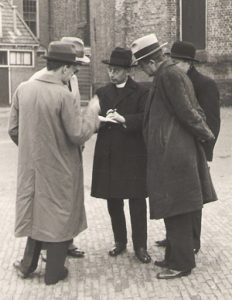Against National Socialism (Nazism)
Although he was sickly in the thirties, Titus clearly realized well the dangers of the upcoming National Socialism. In 1934, he gave a talk to the students about Heroism and the “call for a strong man”. He pleaded for discernment of spirits and to be careful not to be swept away by impressive individuals but the ideals they strive to follow. He warned that one can easily be led astray by appearance. In this talk he fiercely denounced the Race-Blood-Soil mysticism of National Socialism. Titus says about the conceptions: “So one is nobler and purer than the other. The more light it possesses and can bring it to splendor, the more it is also tasked to radiate that light and make it shine over the World. It can only be done if it is free from all stains”. He contrasts this with the unsung “heroism” of the praying and helping person, who honors the countenance of Christ and is his brother’s keeper. “No questioning, no looking back, no judgment. Help”. In 1935, he wrote in the Delusion of Weakness about the persecution of the Jews in Germany. In this he spoke against the “violent eradication of what obstructs the free development of the own strength of the people”. Titus considers as cowardice the act of the small one who pulls down what rises above him to appear not small anymore”. In National Socialist periodicals this drew attention and Titus was accused of sympathizing with communism.
In 1939, he gave a long series of classes about the National Socialist world view in the history of philosophy. In these he expressed plainly his disapproval of the National Socialist positions. Still, Titus, just as the rest of Dutch professors, signed the Arian declaration. Unfortunately, it is impossible to trace his motivations.
 When the German army invades the Netherlands in 1940 Titus Brandsma has already for a considerable time a public anti-national-socialist position. With this he has drawn attention. The occupying forces, however, will soon show that they will not leave in peace the Roman Catholic pillar to which Titus is strongly committed. When the independence of education and the press is threatened it is not only his anti-national-socialist stand which Titus defends. It is, too, the emancipation – gained with difficulty – of the Catholic part of the population that is threatened by the invasion of the Roman Catholic identity of education and press.
When the German army invades the Netherlands in 1940 Titus Brandsma has already for a considerable time a public anti-national-socialist position. With this he has drawn attention. The occupying forces, however, will soon show that they will not leave in peace the Roman Catholic pillar to which Titus is strongly committed. When the independence of education and the press is threatened it is not only his anti-national-socialist stand which Titus defends. It is, too, the emancipation – gained with difficulty – of the Catholic part of the population that is threatened by the invasion of the Roman Catholic identity of education and press.
In the thirties Titus Brandsma has become a close collaborator of Archbishop de Jong in the fields of Catholic education and Catholic press. After May 1940, he was faced in this capacity, first, with the undermining measures of the German occupier which were aimed at Catholic education. Salaries of religious were reduced so much that the existence of schools was threatened. After this came the order to refuse entrance of Jewish children into these schools. As chairman of the Union for Higher and Secondary Education het took the lead in resisting this education policy.
However, especially the case of the press will drive Brandsma to action. In January 1941, the bishops reiterated the condemnation of National Socialism. Some months later they prohibited any membership of the National Socialist organizations. However, the occupying forces were just about to tighten their grip on journalism. The issue became very critical for the Catholic press when NSB (National Socialist Union) advertisements were submitted and a mandate was issued making obligatory the acceptance of the NSB advertisements. Titus was the advisor of the Roman Catholic Journalists Association. In this capacity he wrote a letter that was addressed to all managements and redactors of the Catholic press. In this letter he communicated that the Catholic papers “may not allow these NSB advertisements if they want to maintain their Catholic identity”. He delivers this letter around and explains it personally. In the eyes of the occupiers this action was sabotage. It is not fully clear if he was actually sent by Archbishop De Jong to undertake these visits. Was it Titus Brandsma’s own initiative? Archbishop De Jong declared later that Titus has acted in name and on the authority of the episcopate, but that he left it up to Titus to go or not.
His voyage was betrayed and the reaction did not take long. Monday, 19 January 1942, Titus was arrested by the Gestapo and brought to the jail of Scheveningen. There came weeks of interrogation in the office of the “Sicherheitdienst” (security service) at the Binnenhof in The Hague. In this period he wrote Mijn Cel (My Cell) wherein he gave the daily schedule of a prisoner and that he was ordered to write a defense of why the Dutch people and especially the Catholic population resist the NSB.
Not long after this starts his last journey, toward the Dachau concentration camp.


